Last Wednesday, the Landmark Hotel in Amman
hosted a solidarity event titled "Mads Gilbert in Amman," drawing a
full audience of locals and internationals. The event presented a unique
opportunity for participants to disconnect from their phones and engage in an
educational and enlightening conversation in person with Dr. Gilbert, a
Norwegian Medical Doctor and Professor at the Clinic of Emergency Medicine at
the University Hospital of North Norway, who has served in all of Israel’s
aggressions on Gaza.
اضافة اعلان
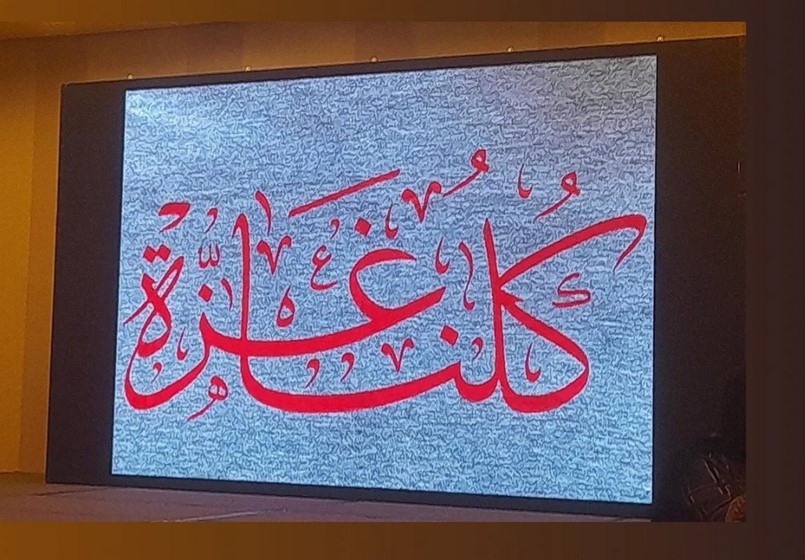
Setting up the event was no easy feat but a
necessary one for Mary Nazzal-Batanyeh, a barrister, social entrepreneur,
impact investor, and founder of Landmark. In a phone call between Batanyeh and
Gilbert, he had asked if he could come to Jordan as he has been stuck in Egypt
for four weeks, waiting for permission to travel through Sinai up to Rafah and
get into Gaza. She graciously hosted him and contemplated organizing an event
while he was enroute.
“While he was on the plane, I said
we need to do an event because there is so much information out, and we don’t
know what is happening, and who better to hear from other than Dr. Mads,” she
said. “We can learn, we can really understand the situation and know how to
mobilize our resources based on the urgent medical needs on the grounds.”
The event was successfully pulled
off in a day and a half.
The healthcare workers bear the
toughest burden of all
As Dr. Gilbert presented the situation
in Gaza and walked the audience through the medical catastrophe, he said, “I
will have a hard time not starting to cry because things are worse than they
have ever been. I want to pay tribute to my brothers and sisters, the health
workers in Gaza. They bear the toughest burden of all, and I have been with
these people for the better part of 17 years. I was in Gaza during the attacks
in 2006, 2009, 2012, and in 2014. These are my brothers and sisters – he
presented a group picture - this picture we took July 2014 during a lull in the
bombing."
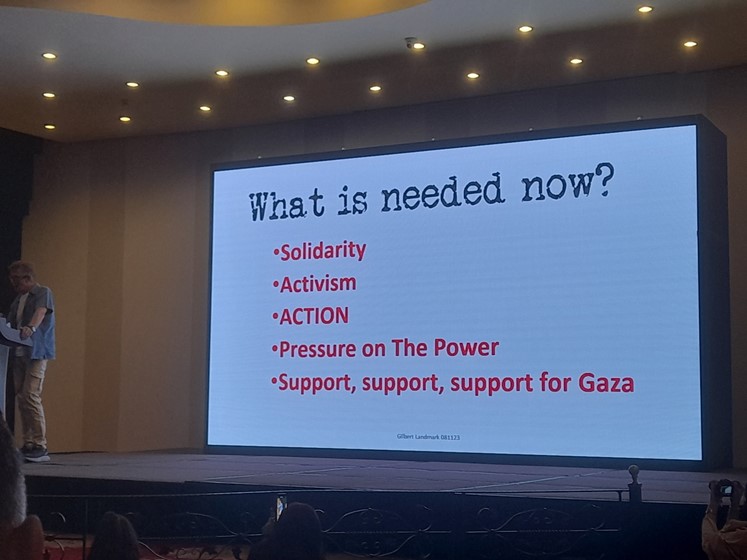
Wanting to amplify Palestinian
voices in healthcare, he shared some examples of just some of the ‘heros’ of
Gaza’s healthcare, including: Dr. Sarah Al-Saqqa, the first female surgeon of
Palestine from Gaza, who just received her final examination from the British
College of Surgery; Dr. Marwan Abusada, the most powerful surgeon he has ever
met, doing the triage and sorting at the entrance of Shifa Hospital; and Dr.
Sobhi Skaik, the head of Shifa hospital for many years. "He was my boss
during the attacks in 2009 and 2014. He is very fierce, one of, if not the very
best leader I ever had. He retired but did not want to retire, so he became the
first medical leader of the new Gaza Cancer Center."
The point of the picture is to
show that these saviors are not white
Gilbert criticized the colonialist
mindset of white saviors. "The point of this picture is the beauty of the
people; these are the heroes. Because so often the white man is the hero, the
white man coming on a two-week visit taking selfies and going home and raising
money for the organization. Too much of the international relief industry is
based on colonial attitudes. These are the heroes, the ones that have their
shoes on, they are the ones who are standing in the fog of blood and doing the
work night and day. My heroes and the people of Gaza and all the volunteers
never give up, true heroism and true moral greatness. The local Palestinian
staff - they never give up, they never give in, and they never leave their
patients."
Solidarity is knowing the facts
and the realities
Speaking of solidarity, he
emphasized the significance of knowing the facts and the realities. "We
need to discuss the history of Palestine and occupation because we cannot let
it happen again - that mass murder passes while we are sleepily watching
television or turning our back to those who are prosecuted and are victims of
racism and killing. We have to stand up, not only for ourselves but for our
kids and our grandkids because we don't want this world, we don't want a world
where power equals right, we want the world where fairness, Rules of
Engagement, or the Geneva Convention, where the Declaration of Human Rights is
prevailing."
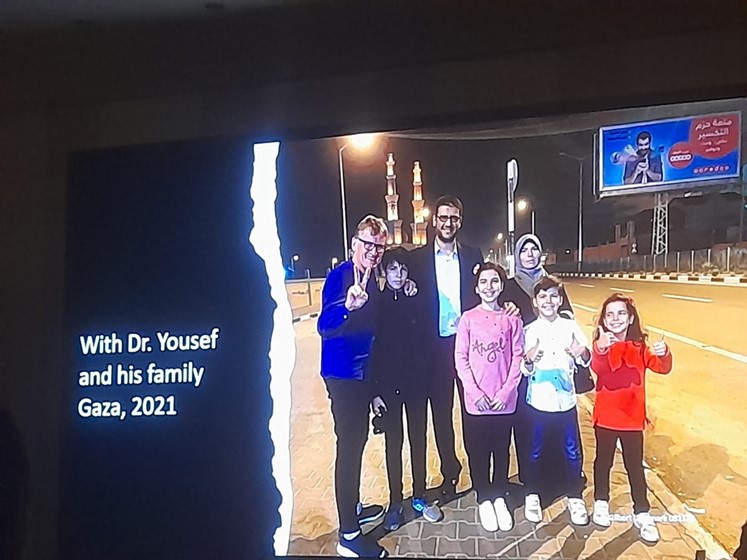
Gilbert, like he does every single
time there is bombing, flies immediately to Egypt and enters Gaza through
Rafah. This time, he has been stuck in Egypt for four weeks, waiting for
permission to travel through Sinai up to Rafah and get into Gaza.
This solidarity is supported by
his workplace. "I am paid by my hospital, and the hospital considers this
my activities here as part of my medical duties because we want to be an
international solidarity hospital. That is why I'm here because I come on
behalf of all my colleagues who all support me and say go to Gaza on behalf of
all of us. I am traveling now with the small Norwegian NGO called Norwegian Aid
Committee, which we founded in 1983."
There is no time, there is no
time, there is no time
While he was preparing his presentation
for the event, he received a call from his dear friend and colleague Minister
of Health, Dr. Yousef Abu Al-Rish. "His voice was different from all I
have heard through the years I have known him, I have worked with him and
talked with him on the phone. His voice no longer had control; he said to me,
and he said it three times: ‘there is no time Dr. Mads, there is no time, time
has run out, we are going to die now.’ He is a man of great strength, of great
leadership, of immense power, is a strong believer, he is a fantastic medical
doctor, I look up to him. He stands tall."
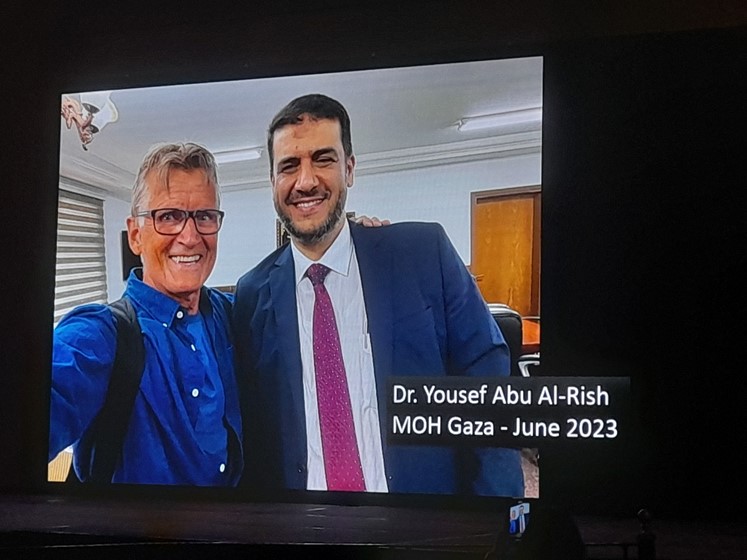
He also stressed the feeling of
urgency Abu Al-Rish conveyed to him. It has come to a point where everything is
at the brink of collapsing. A university-class hospital has nothing to help the
wounded. The conversation went on:
We continue to provide services. But we
have no medicine.
What can you do for the injured children?
(I can hear his voice thickening)
We pray for them … That’s what we do, we
pray for them.
Despite the dire situation,
Gilbert highlighted the healthcare workers' humanity, love, and solidarity.
"But they don't give up even if they don't have the resources we expect to
have in the modern hospital. They don't give up; they find spaces for patients,
they put them on the floor, they put two or three in each bed, they care for
them, they give them a blanket, they try to put on some bandages, they comfort
them, they look for their parents, and they don't give up."
Living Hell
In knowing the facts, during the
presentation, he presented a scientific paper from a very famous British
scientific journal, The Lancet, which was published on the 17th of January
2009, the day his team was replaced by another team at Shifa, and then it was
published online immediately. They described the situation in Shifa as a
"Living Hell." "If it was a living hell in 2009, what on Earth
shall we say about the situation in Gaza today? Gaza 2023 will make us dub this
as if Inferno looks like a tea party."
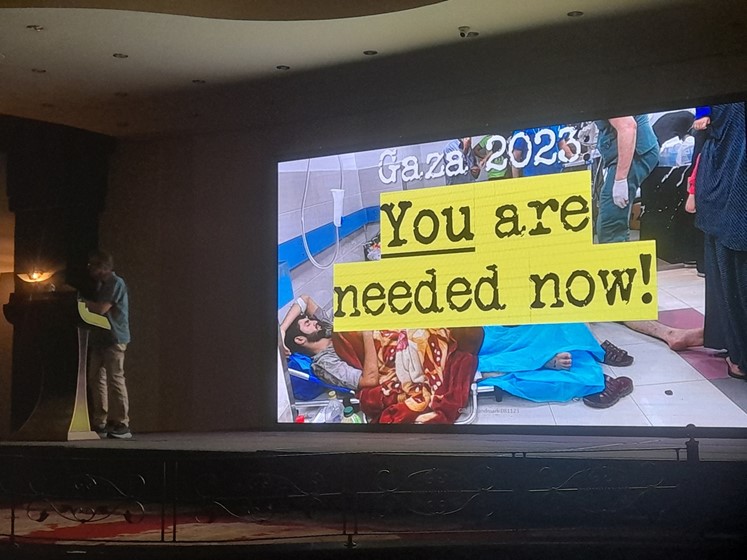
Because of the siege and because
the storage in Gaza before the attack was 40 percent of the essential drug
list, the hospitals were all already lower than half of the essential drug
list. "I am told by a very reliable source that all these trucks that come
from Al-Arish in Egypt are not driving from Al-Arish to Rafah directly. They
are driving from Al-Arish eastwards to Kerem Shalom, the Israeli entry point
down south where I'm told that Israelis are going through every box of relief,
and they take out what they don't want to get in, and they specifically take
out anesthetic drugs."
He also some of the doubts that
people, including U.S President Joe Biden have had on the casualties "I
know how the Palestinians are collecting the numbers. I am a scientist and a
professor, and I've used these numbers to do research - I know exactly how they
collect the numbers, and there's absolutely no reason to doubt them. They are
so precise that they are used in all the UN reports and even used by the US
State Department itself."
"The reason behind this doubt
is utterly colonial, as if Palestinians are ‘subhuman.’ When you ask Mr. Biden
to the extent that he can hear or think, so what is the proof you have that
these numbers are false? Nothing,” he continued by saying.
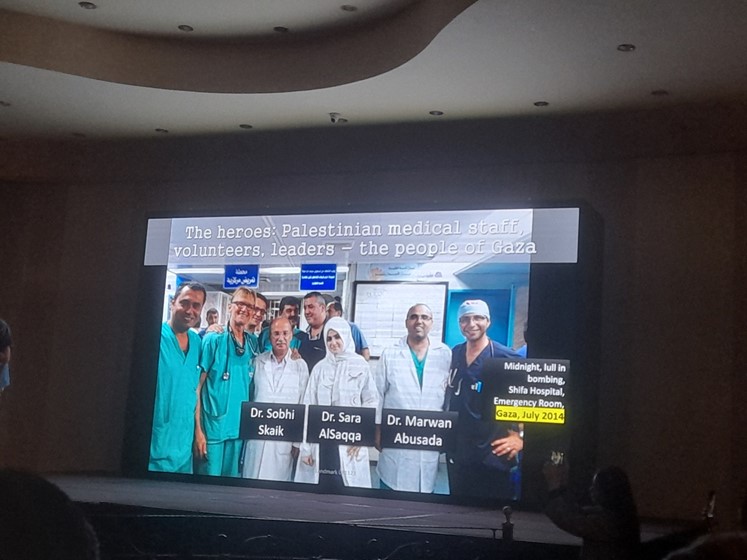
Regarding public health, he
educated the audience on the current situation sharing "There is an
impending health disaster in Gaza. There will be hepatitis, gastrointestinal
infections, and fecal-oral contamination. A UN school in the southern of Gaza,
housing 28,000 displaced people, has only two toilets. "Epidemic diseases
will follow, Cholera and Dysentery. And it is all very calculated."
Will never be forgiven or
forgotten
Gilbert
concluded by describing Israel’s current situation as "walking backward
off the cliff. What they have done is never to be forgiven and never to be
forgotten. And it is galvanizing us as activists and fierce fighters against
apartheid and racism."
Read more Features
Jordan News








